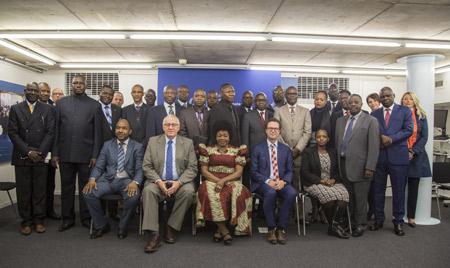ICC holds third seminar on cooperation with focal points of States where investigations have been opened or are taking place

The third Seminar on Cooperation with Focal Points of States where investigations are being conducted, opened today, 2 November 2015, at the seat of the International Criminal Court (ICC) in The Hague, The Netherlands.
On 2-6 November 2015, a number of officials and focal points from the Democratic Republic of Congo, Uganda, the Central African Republic, Kenya, Libya, Côte D'Ivoire, and Mali will meet with Court officials to discuss cooperation with the ICC. Representatives from six other States with experience cooperating with the Court will also attend, as will ICC Staff tasked with liaising with national authorities
Emphasising the important role of national focal points, ICC First Vice-President Judge Joyce Aluoch said "if we want to make cooperation work, we must develop mutual understanding and remain in constant dialogue. For this reason, events such as this seminar provide an excellent opportunity to do just that." "Working together and learning from one another is the only way in which we can achieve our common objectives of justice and the end of impunity," Judge Aluoch added.
ICC Deputy Prosecutor James Stewart said: "Indeed, the ICC was but a dream only 20 years ago, and if it was not for the commitment and persistent efforts of your countries, we would not be here today. As embodied by the principle of complementarity that frames the system of international criminal justice established by the Rome Statute, the ICC is part of a network of national judicial systems, comprising more than 120 States. It is our joint actions, at the national and international levels, that bring life and purpose to this grand enterprise".
ICC Registrar Herman von Hebel underlined the importance of cooperation, stating that "effective and expeditious proceedings are intimately linked to ensuring timely and effective cooperation through the assistance of the designated focal points of the situation countries thus leading to better justice system for the victims". "I hope that this yearly forum of exchange will continue to develop practical and proactive solutions for the complex challenges ahead of us", he further added.
States play an essential role in implementing the ICC's Decisions, Orders and Requests, and States Parties often nominate a national focal point to coordinate and channel communications between national authorities and the ICC. This week, these focal points will share lessons learned and explore matters relevant to their experience working with the ICC through their national systems.
Enhancing dialogue between the ICC and States Parties on cooperation is of key importance to the Rome Statute system. This Seminar aims to address a wide range of issues related to cooperation including Witness and victims' protection, outreach in situation countries, the participation of States in proceedings and various international agreements between State Parties and the ICC.
The Seminar was funded through the generous contributions of the European Union and the Governments of The Netherlands and Finland.
The first and second Seminars on the same topics were held on 13-14 July 2011 and 17- 21 November 2014 respectively. They are part of a larger continuing effort to further advance the ICC's processes, in particular in countries where ICC investigations are ongoing, with a view to realising the commitment of States Parties to end impunity and provide justice for the victims and affected communities of Rome Statute crimes.
The International Criminal Court is an independent permanent court that tries persons accused of the most serious crimes of concern to the international community as a whole, namely the crime of genocide, crimes against humanity, war crimes and the crime of aggression.
For further information, please contact Fadi El Abdallah, Spokesperson and Head of Public Affairs Unit, International Criminal Court, by telephone at: +31 (0)70 515-9152 or +31 (0)6 46448938 or by e-mail at: [email protected].
You can also follow the Court's activities on YouTube and Twitter